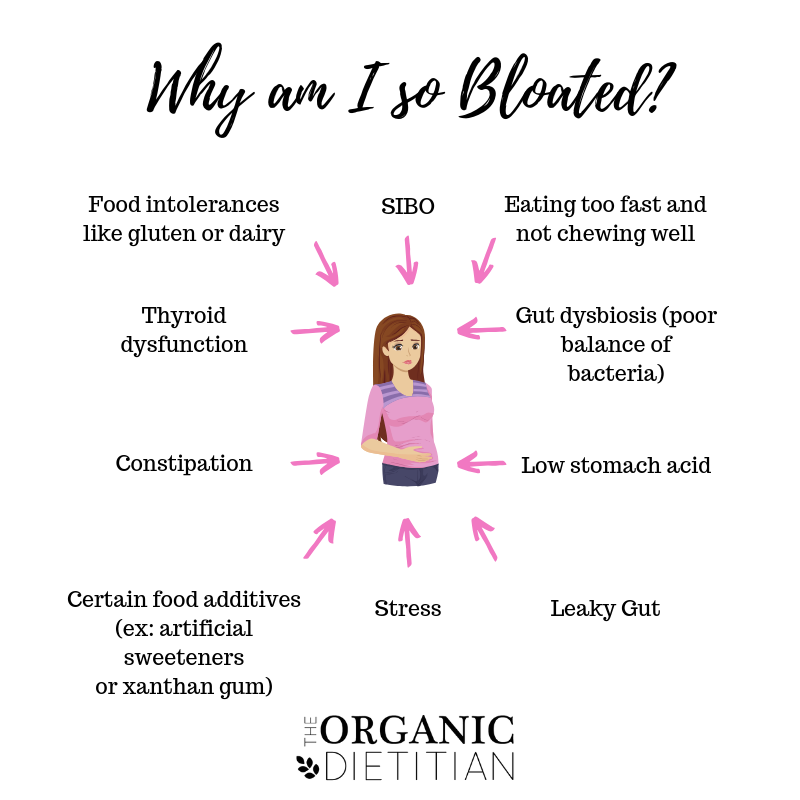5 August, 2020
Common Causes of Stomach Bloating + 5 First Steps to Beat the Bloat

“Why am I so bloated?”
If only I had a dollar!
Bloating is one of the top complaints I hear from my clients, and something I used to struggle with as well.
Can you relate? Do you know that uncomfortable fullness that has you unbuttoning your pants and dreaming of elastic waistbands!? What it is like to feel 6 months pregnant at the end of the day?
While most people experience bloating at some point in their lives, experiencing bloating on a regular basis is a sign that something is not quite right.
Not to mention that it’s incredibly uncomfortable!
So let’s take a closer look at 10 of the most common causes of belly bloat. Then, we’ll explore five foundational steps you can take today to start beating the bloat.

10 Common Causes of Stomach Bloating (plus a BONUS)
1. Low stomach acid
Yes, stomach acid is a good thing! In fact, low stomach acid — not excess stomach acid — is most typically to blame for acid reflux.
Without adequate stomach acid, food can’t be properly broken down and digested, causing belly bloat, gas, and other uncomfortable GI symptoms.
Check out this post I wrote on 5 Lifestyle Behaviors at the Root of your Acid Reflux.
2. Thyroid dysfunction
Thyroid disorders like hypothyroidism — a condition in which the thyroid gland doesn’t make enough hormones — can result in bloating, as well as constipation, diarrhea, heartburn, and nausea.
This is just one of the many ways our hormonal health and digestive health are so intimately connected!
3. Eating too fast and not chewing well
As simple as it may sound, chewing is an important part of the digestive process, mechanically breaking down food. Plus, saliva contains necessary digestive enzymes.
4. Food intolerances
True food allergies and food intolerances are very different. They illicit a different immune response in the body, and whereas an allergic reaction can be very severe and even life threatening, symptoms of food intolerances can be more nuanced.
Belly bloat, gas, and diarrhea are the most common symptoms of food intolerances, though they can also include hives and rashes, nausea, fatigue, headaches, brain fog, and a runny nose.
But before you run out and spend a lot of money on a food sensitivity test know that they aren’t the most accurate tests and if you have a lot of food sensitivities it is often rooted in digestive issues.
5. Certain food additives
Certain ingredients like artificial sweeteners or xanthan gum can cause bloating and other symptoms of GI distress.
This is just one of the many reasons to limit processed foods and transition to a nutrient-dense, real food diet!
6. Stress
Our bodies must be in a relaxed state to properly digest food. And so it’s common to experience symptoms of digestive distress like bloating when chronically stressed.

7. Constipation
When you’re constipated or “backed up,” the bacteria in your colon continue to ferment the linger stool, commonly resulting in bloating and gas.
Reminder: you want to be having a bowel movement at least once a day!
Not sure what healthy bowel habits should be like? Check out this post I wrote on 10 Signs of a Healthy Poop: What is normal? What does it tell you about your health?
8. Leaky gut
Leaky gut, also known as increased intestinal permeability, is a digestive condition in which bacteria and toxins are able to “leak” through the intestinal wall.
Common symptoms include chronic diarrhea, constipation, or bloating, as well as:
- Nutritional deficiencies
- Fatigue
- Headaches
- Confusion
- Brain fog
- Skin problems, such as acne, rashes, or eczema
- Joint pain
9. SIBO (small intestinal bacteria overgrowth)
Small intestinal bacterial overgrowth (SIBO) occurs when there are excess bacteria (including the “good” bacteria) in the small intestine.
In addition to bloating, other common symptoms of SIBO include:
- Loss of appetite
- Abdominal pain
- Nausea
- Diarrhea or constipation
- Excessive or painful gas
- Frequent burping
- Being “diagnosed” with IBS
10. Gut dysbiosis (imbalance of bacteria)
Gut dysbiosis is an imbalance of the “good” and “bad” bacteria in the gut microbiome. Gas and bloating are the most common symptoms.
Many reach for probiotics when they are experience bloating but probiotics alone won’t heal the gut. They don’t work how you think they do.
Check out this post I wrote on How Probiotics Really Work (and Why They May Not Fix Your Digestion).
11. Mold
Digestive problems like bloating are a less common side effect of mold but it can happen as mold can often live in the gut. Mold can be eaten but can also be inhaled or absorbed through the skin which can allow them to take up space in the digestive tract.
5 First Steps to Beating Belly Bloat
Now you may be wondering what you can do to remedy your chronic belly bloat.
Though some of the root causes of chronic bloating mentioned above can be quite complex, it’s always best to start simple and with the foundations:
- Take a deep breath and relax before eating
- Take your time and actually chew your food!
- Eat mindfully, being sure not to overeat
- Work to eliminate processed foods from your diet
- Use herbal digestive bitters to enhance digestion before meals
But what if these foundational steps aren’t enough? What then?
First and foremost, it’s imperative to figure out the root cause of YOUR belly bloat.
This is where a comprehensive stool test like the GI MAP comes into the picture. It can provide you with a lot of information about your gut including pathogens present, enzyme production, and gluten sensitivity.
Testing not only helps see what pathogens may be in the gut contributing to bloating, but it can help to customize what you do to fix the issue. And it is helpful to see if what you are doing is working when you retest.
I run stool tests and microbial organic acid tests on all of my clients and find them to be priceless!
You can learn more about the testing I offer and working with the Organic Dietitian team here.
Now let’s keep the conversation going in the comments below!
Do you struggle with chronic belly bloat?
Did this help to shine light on anything in particular?
What do you think about these foundational steps to beat your belly bloat — are you willing to give them a try? If yes, please do report back in the comments below!















 80% of chronic dis-ease is rooted in stre
80% of chronic dis-ease is rooted in stre
 As
As 
